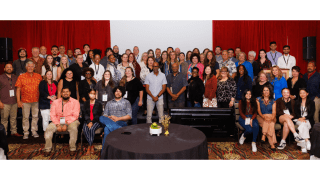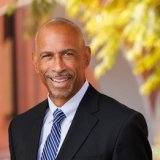What takes place when nearly 60 education leaders from nine districts across California unite to address their schools’ most urgent issues? They create an environment that leads to tangible, actionable solutions. The second annual Breakthrough Leadership Institute, hosted by the Office for Professional Learning at USC Rossier, took place from July 14 to 17 and proved to be a place designed for impact, where leaders took a deep-dive into their school’s issues and walked away with a personalized engagement plan.
“The Breakthrough Leadership Institute is not your typical conference, we have brought together some of the nation’s most experienced education leaders,” said USC Rossier Dean Pedro A. Noguera. “Participants will learn from and interact with experts to establish a forward-thinking mindset to address their most pressing challenges and work with their facilitator to establish a path forward.”
The three-day intensive institute, led by Darline Robles and Xiomara Mateo-Gaxiola, was built around four interrelated pillars that research and practice have shown to bolster the ways in which relationships lead to educational equity: disrupt how a district provides support to a community, innovate ways to personalize teaching and learning, reimagine definitions of how students feel connected in schools, and advocate clear definitions, actions, and timelines for student growth.
Proud Trojan and Shadow Hills Engineering & Design Magnet Academy Principal Krishna Spates EdD ‘22 brought 19 teachers to help figure out how to increase the sense of belonging and connection among students, caregivers, teachers and staff. “I believe we can improve our achievement data through some of the neuroscience work that we learned from Professor Immordino-Yang, in order to make every person on our campus and in our community feel welcome,” said Spates.
Each day was designed to be an immersive learning experience, leveraging multiple formats including keynotes, case studies, panels, Q&As and breakout sessions. Featured speakers included an opening keynote address from Dean Noguera where he interpreted educational equity strategies and described how they have become models for disruption and sustained inquiry. Professor Mary Helen Immordino-Yang’s keynote exposed the deficits of the traditional learning environment and offered educators insights on the critical role emotion plays in learning. Case study seminars led by professors Theodore R. Burnes and Yasemin Copur-Gencturk saw participants confront contradictions in how students, teachers and staff feel connected in schools. Professors Jenifer Crawford and Robert Filback led participants in an exploration of democratic principles that strengthen students’ capacities to become engaged citizens in their communities.
Every school district came to the Breakthrough Leadership Institute with a problem of practice that they interrogated with their facilitator during breakout sessions. This dedicated learning space for in-depth discussion, planning and creation was guided by their facilitator, an experienced superintendent who will continue working with the district into the fall and spring. On the final day, each district presented their problem of practice along with their personalized engagement plan that laid out clear definitions, solutions, actions and timelines to support student belonging.
Dean’s Superintendent Advisory Group member and Sierra Sands Superintendent April Moore EdD ‘12 came to the Breakthrough Leadership Institute with teams from two schools and the district office to reimagine their middle school experience. “It was amazing to see the evolution of our thinking over the three days with probing from Dean Noguera and Professor Christina Kishimoto,” said Moore. “They challenged our thinking and we recast our timeline and approach to ensure our students are at the center of this reimagination.”






